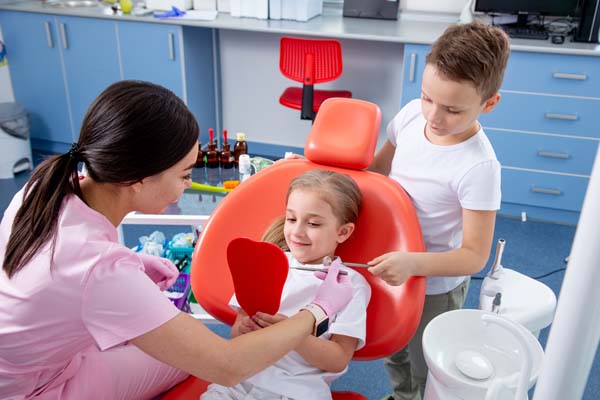How Early Should Your Child See a Kid Friendly Dentist?

Kid-friendly dentists encourage parents to schedule their child’s first dental visit before the first birthday. This serves as an opportunity to educate the parent on how to care for their child’s oral health at home and to get a head start on assessing the child’s future oral care needs.
A review of the first visit with a kid-friendly dentist
This review discusses when to schedule a child’s first dental visit, the purpose of the visit, and what typically takes place. Of course, every kid-friendly dentist is unique, and each visit is personalized based on the child’s age and specific oral health concerns. However, having a general understanding of what takes place during the visit is helpful.
When to schedule a child’s first dental visit
Parents should schedule a visit with a kid-friendly dentist by their child’s first birthday or within six months of the first baby tooth’s appearance, according to the American Dental Association (ADA). It is okay if a child is older than one and has not yet visited the dentist, although doing so as soon as possible is strongly encouraged.
The purpose of the first dental visit for children
The purpose of the first dental visit for young children is for the kid-friendly dentist to get a sense of the child’s teeth development and to answer any questions the parents may have. Parents can use the appointment as an opportunity to learn what to expect when the first teeth start to come through. They may offer advice on the teething stages and when the child needs to come back in for another visit.
What to expect during the first dental visit
The first dental visit is a calm and non-invasive process. The kid-friendly dentist can start with a brief chat with the parents. They also conduct an oral examination, which involves having a look at the child’s mouth to see if there are any potential concerns. Additionally, x-rays may be required. This is also non-invasive and gives the dentist a better look at the things they cannot see through an oral examination. Of course, the dentist can also answer any questions the parent(s) have.
Caring for a child’s oral health at home
The kid-friendly dentist can provide instructions on how to care for the child’s oral health at home between visits. There is not a lot to do until teeth begin to come through, but it is still important for parents to track the progress of their child’s teeth development and let the dentist know if there are any complications.
Contact our team to learn more about early dental care
Parents can reach our dental team by phone to learn more about when to schedule a child’s first dental visit. On the initial call, we can answer questions and arrange a convenient time for you to meet with our team for a visit.
Request an appointment here: https://www.dentistinridgewood.com or call Aston Dental at (201) 620-9996 for an appointment in our Ridgewood office.
Check out what others are saying about our dental services on Yelp: Kid Friendly Dentist in Ridgewood, NJ.
Related Posts
Choosing a kid friendly dentist is critical for your child’s dental health. The right dentist understands a young patient’s needs and their development. As a parent, you need to be aware of those big moments in a child’s oral wellness. This will help you keep on top of good oral hygiene at every stage of…
Family dentists are general dentistry professionals who have undergone training to learn how to treat patients of different ages, ranging from school-aged children to the elderly. They are responsible for helping all patients maintain good oral health through a number of options, including providing regular check-up appointments and preventive measures, as well as addressing warning…
Some people may not realize how improper oral care can have a negative impact on their overall health. Untreated tooth decay does not heal without treatment and usually worsens over time. When those with multiple cavities ignore their dental needs, they may be putting themselves at risk for a variety of other medical problems, some…
In general dentistry, fluoride treatments are common. Fluoride is a mineral found in bones and teeth, as well as water, plants, soil, rocks, and air. When used by dentists, fluoride strengthens tooth enamel. Therefore, dentists generally use fluoride as a preventative treatment against cavities. Additionally, fluoride can be found in most public water supplies. In…

